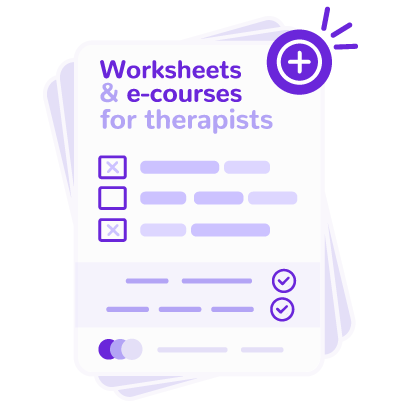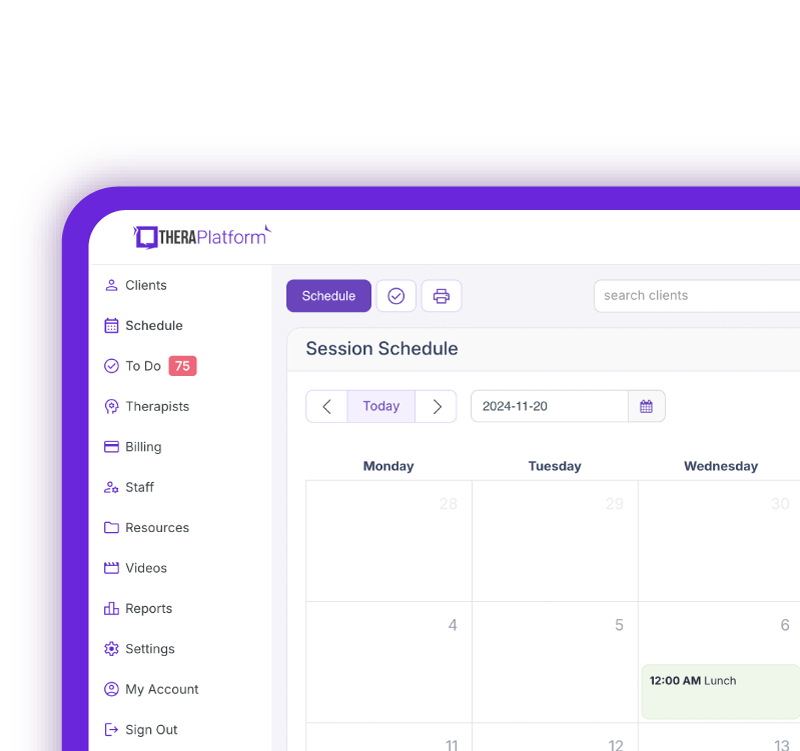Therapy and medication

Therapy and medication. It's common for clients to think of these as a complementary pairing but the truth is therapists can’t typically prescribe medication. But clinicians can often recognize that their clients would benefit from some medication assistance.
Summary
- Therapists cannot prescribe medication, but they play a key role in identifying clients who may benefit from it and initiating referrals to medical providers.
- Medication may be needed when therapy alone is ineffective, a client has a condition that typically requires medication (e.g., bipolar disorder, ADHD, schizophrenia), therapy needs a boost, or the client’s symptoms are severe and impair daily functioning.
- Therapists should explain their reasoning transparently, address stigma, educate clients on benefits and side effects, remind them that medication can be temporary, and remain non-defensive if a client refuses medication.
- Because therapists cannot prescribe medication, they must collaborate with psychiatrists or physicians by obtaining a release of information, monitoring client progress, and ensuring appropriate communication with prescribing professionals.
- Some clients may want to stop therapy once medication helps, while some providers may be reluctant to discontinue medication. Therapists should navigate these situations with client-centered care in mind.
Certain psychological problems can’t effectively be treated with therapy alone. It is the therapist’s job to identify clients who would benefit from therapy and medication in the form of psychotropic drugs and begin that referral process. Let’s look closer at when a therapist can prescribe medication and what a clinician needs to do to make it happen.
Streamline your practice with One EHR
- Scheduling
- Flexible notes
- Template library
- Billing & payments
- Insurance claims
- Client portal
- Telehealth
- E-fax

When should a clinician consider therapy and medication for a client?
The following situations may call for therapy and medication referral:
Therapy alone is not working: When a client has been in therapy a while but they aren’t making the expected progress, medication might be in order. Of course, you might also have to reassess whether therapy is right for them and whether you are the best fit as a therapist, but medication might be the answer. For example, certain problems, such as eating disorders and depression, seem to be best treated best by a mix of therapy and medication, rather than therapy alone.
The client has a condition that usually requires medication: Some psychological problems are difficult to treat without medication. People with diagnoses such as bipolar disorder, schizophrenia, and attention-deficit hyperactivity disorder (ADHD) frequently need medication to adequately function. If your client has one of those problems, they may not display significant improvement without medication.
Therapy needs a medication boost: Medication is often needed to help clients benefit from the therapeutic experience. They may not be able to take advantage of all therapy has to offer without it. For example, a client suffering from depression may lack the motivation to do their therapy homework, making it pretty much pointless, But, on antidepressants, they find the energy to complete homework and start to profit from what they learn.
Their problems are too severe: Many psychological difficulties are a matter of degree. Certain problems are more severe, making the need for therapy and medication more prominent. For instance, a client with persistent depressive disorder (i.e., dysthymia), may find therapy productive without medication, but someone with major depression is more impaired and makes little progress.
Both diagnoses are types of depression but major depression is more debilitating and makes improvement difficult. In general, if a client is having difficulty with everyday functioning, medication is a primary option.
Free Resources for Therapists
Click below and help yourself to peer-created resources:

How do I bring up medication with a client?
Now that you have decided that medication is appropriate, here is how you can broach the subject with your client:
Explain your reasoning: It is important to be transparent with your clients as to why you think they would benefit from therapy and medication. This isn’t a situation where you can say, “Because I said so” and have them be satisfied. Discuss their current struggles and how you see medication helping them.
Quick Tip: Use their treatment plan. Point out their individual goals and how therapy and medication can help them reach their objectives.
Address stigma: Let’s face it, treatment for mental health problems comes with stigma. People that need psychological assistance are seen by some as “crazy” and “unhinged”. Regrettably, taking psychotropic medication is no exception. Although taking a pill might be met with derision by certain people, no one has to know it is happening.
Quick Tip: Reframe. Let clients know that taking a pill for a mental health problem is not much different than taking drugs for a physical illness.
Educate: Many people are scared of taking psychotropic medication because they don’t know much about them and fear the worst. Explain the possible benefits and side effects of certain drugs that they may end up taking.
Quick Tip: Warn clients against making too much of possible severe side effects they see on the internet. Yes, severe side effects (e.g., teenage suicide from anti-depressants) do occur and get a lot of publicity, but they tend to be very rare.
Remind them they are temporary: One of the downsides of medication is that it only works when you take them. Of course, this can also be a positive. If a client does not like a side effect or does not think they are working, they can quit at any time.
Quick Tip: Alert clients that many psychotropic medications require a few weeks to produce the desired result and they should never be stopped "cold turkey”.
Don’t get defensive: Starting a medication is a difficult decision and many clients are not going to do it even with your recommendation. If a client refuses, don’t become defensive. Explore the rationale for their choice and acknowledge that using any drug is a lot to consider. Additionally, let them know that you respect their ability to make the best decisions for themselves.
Quick Tip: Just because a client refuses medication at one time does not mean they will refuse it forever. Let it go for now and if an opportunity arises later to discuss it, take advantage of it.
Practice Management + EHR + Telehealth
Mange more in less time in your practice with TheraPlatform

.
Working with medication providers
Because the majority of therapists can’t prescribe medication, clients must rely on another professional to prescribe the necessary drugs. Here are some considerations for therapists when working with medication providers:
Release of information: Therapists must obtain a release of information from clients to discuss medication needs with a provider. You can’t share information without one, even though you are both professionals. Even if clients sign a blanket release at the beginning of therapy, it is a good idea to have a specific consent that outlines what can be shared with a medication provider.
Monitoring: You are probably going to know your client much better than a professional who prescribes medication. Due to insurance restrictions, they are likely to meet with your client for 15-minute sessions once a month, if not less frequently. That isn’t a lot of time to know what is going on with a person. That is why it is the therapist’s job to maintain regular communication with the provider and give them the information they need to prescribe the correct medication and dosage. Communication, of course, is frequently a challenge. It can be difficult to get a psychiatrist or physician’s assistant on the phone due to busy schedules.
Ending medication: Another struggle can be attempting to convince a prescribing professional that a client no longer wants or needs medication. Prescribing medication is how certain professionals make a living and they tend to be biased toward taking a pill. Therefore, they may not agree with your assessment that medication is no longer necessary. This is made even more difficult when the provider is a psychiatrist or other M.D. For better or worse, clients tend to listen to medical doctors over people with master’s degrees or PhDs.
Ending therapy
Alternatively, sometimes you have a situation where a client decides that the medication is working and they don’t need therapy anymore. I mean, why invest the time and money in counseling when you can simply take a pill? There is no right or wrong answer in these situations. Therapists just need to be mindful that working with another professional with a slightly different expertise might bring about certain challenges.
You might not think of therapy and medication as kindred spirits but they have a complementary relationship in mental health. Part of the therapist’s job is to recognize when medication is needed to enhance therapy and overall client well-being.
Streamline your practice with One EHR
- Scheduling
- Flexible notes
- Template library
- Billing & payments
- Insurance claims
- Client portal
- Telehealth
- E-fax

Resources
Theraplatform is an all-in-one EHR, practice management and teletherapy solution that allows you to focus more on patient care. With a 30-day free trial, you have the opportunity to experience Theraplatform for yourself with no credit card required. Cancel anytime. They also support different industries including mental and behavioral health therapists in group practices and solo practices.
More resources
- Therapy resources and worksheets
- Therapy private practice courses
- Ultimate teletherapy ebook
- The Ultimate Insurance Billing Guide for Therapists
- The Ultimate Guide to Starting a Private Therapy Practice
- Mental health credentialing
- Insurance billing 101
- Practice management tools
- Behavioral Health tools
Free video classes
- Free on-demand insurance billing for therapist course
- Free mini video lessons to enhance your private practice
- 9 Admin tasks to automate in your private practice
References
American Psychological Association (2017). How do I choose between medication and therapy. https://www.apa.org/ptsd-guideline/patients-and-families/medication-or-therapy#:~:text=For%20depression%2C%20two%20kinds%20of,effective%20than%20either%20treatment%20alone
Good, A. The Sibley Group. Mental health and meds: A therapist’s advice on when to consider medication. https://thesibleygroupdc.com/mental-health-and-meds-a-therapists-advice-on-when-to-consider-medication/
Mayo Clinic. Persistent depressive disorder. https://www.mayoclinic.org/diseases-conditions/persistent-depressive-disorder/symptoms-causes/syc-20350929



